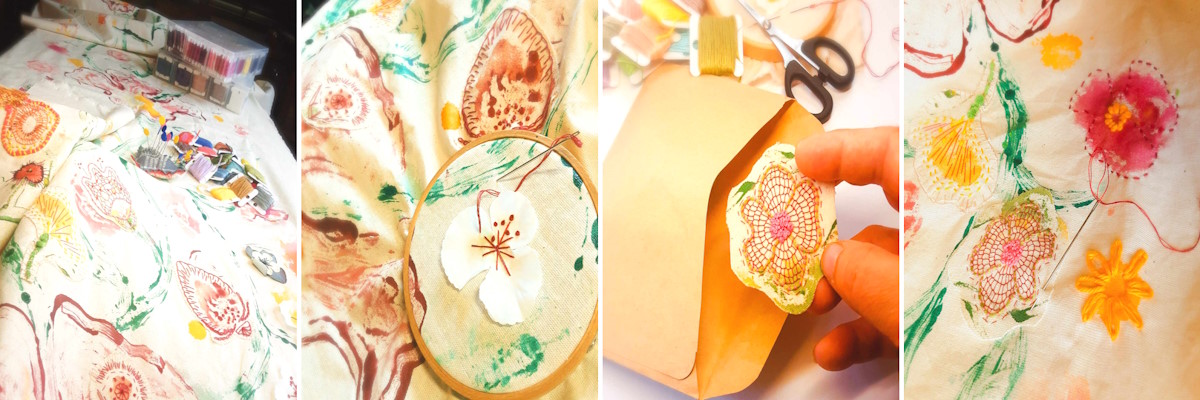Kate Joblin, Councillor
In a time of geopolitical turbulence, it is difficult to think what we here in Whanganui, Aotearoa can do in support of the humanitarian crisis in Palestine. The Flowers for Palestine, Putiputi mō Parihitini, project so thoughtfully embodies togetherness and remembrance to reflect on the struggle and loss experienced by those in
Gaza. Putiputi mō Parihitini has allowed our community to stand together in solidarity, to remember that peace is our goal, for us and for future generations. This initiative for peace has given us the gift on a very personal level, and on a community level, to be part of the change we want to see in the world.
Jenny Duncan, Councillor
Flowers for Palestine – Putiputi mō Parihitini is a heartfelt journey of those who felt powerless to support the peoples of Palestine/Gaza. The embroiding of these beautiful flowers is a way to transmute the pain and trauma of viewing what is now openly available online. It provides hope for a peaceful future and encouragement for the peoples of Palestine that they are not forgotten. It was important to me that I invite Renata and supporters to bring the beautiful, embroidered artwork into the Whanganui Council Chamber and for Renata to speak to her purpose. This is about peace, love and connection. It is about humanity. The more people who are able to see the embroidered work and hear the story, the more seeds of peace and humanity will be sown.
Raewyn Hall, NZASW, DAPAANZ
Tēnā koutou
…Having over 50 years experience in the mental health and addictions area I am excited about involvement in this positive collaborative and healing process. Trauma-related research indicates the strength of a project such as this involving individuals sharing and working together towards the creation of a positive inclusive community.
It offers the opportunity for people having a common goal/outcome in creating a piece of work that reflects and articulates each individual journey and experience of pain and distress through embroidery, conveying emotions without the need for words. It is ultimately healing for the participants and those witnessing the final product in our community.
This will be a proven dynamic process for all involved whetjer involved in the planning or using the needle.The final piece would be available for reflection for those in the wider community touching many more than those who had the benefit of working on this collaborative project.
Ngā mihi
Renata Szarvas
Tēnā koutou katoa
I’m writing as the founder and one of the main contributors to the project Flowers for Palestine. Originally from Hungary, I have lived and worked as a picture framer and an artist in Whanganui since 2008. Textile work and stitching has been part of my life from childhood. I find myself best expressed through threads and textiles.
My family was directly affected by the aftermath of WWII and I know all too well how trauma unhealed ripples through generations. Witnessing the ongoing war on Gaza I notice how a deep sense of helplessness and distress affects my own emotional well-being as well as many others in my community.
Serving artists as a picture framer for over 20 years and as a practicing artist myself, I know much about the healing effects of art practices, and in particular, working with textiles and stitches. The tactile nature of handling fabric and thread, the rhythmic motion of the needle, and the focused attention required for stitching all offer a therapeutic outlet for many who have experienced stress and trauma.
In my experience, collaborative embroidery sessions foster a sense of community, as people come together to embroider and share their experiences. I truly believe in this project, in the value it can bring to my community and will do everything in my power to make it a success.
Ngā mihi nui
Marcia Amadio
Tēnā koutou
I am writing in support of the Embroidery group – Flowers for Palestine. As a recently retired counsellor, I know the value of creativity in the healing process. I commend this group for recognizing the distress our community is experiencing in situations personal, national and international and their efforts to provide an outlet for this grief.
A group process that meets the human need for connection, creates a sense of belonging and provides a means of expression through stitching and conversation can be therapeutic and fulfilling. This group will enable participants to increase their needle skills, build relationships and provide a space for mindful reflection.
Ngā mihi nui
Janet R. Mace
I write to support this creative initiative promoted and organized by Community artists, business owners and leaders in Whanganui. There are a number of features of this initiative which make it a very special, unique project. The intention for the project is to provide an opportunity for people to express compassion and action in response to a global crisis. The community- base for the project means it will provide a forum for people, over an extended period of time, to gather, learn, dialogue and support each other.
I have practiced as a professional counsellor/supervisor for more than three decades and my experience in the field has taught me that where there is personal or collective trauma and grief, a large part of healing arises from belonging to a nurturing and creative community. I have also worked as a group facilitator and know that positive outcomes result from well-facilitated, shared experiences.
I have spent a decade living in the vibrant city of Whanganui. I am very happy to support and endorse this project. The warm, inclusive welcome to all those wanting to contribute to a “powerful symbol of solidarity and love” is a very worthy objective – especially in these times.

